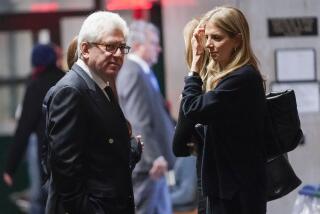Copyright suit roils classical music world
- Share via
In a case that has sent tremors through the classical recording industry, the British record label Hyperion faces the prospect of paying nearly $1.9 million to a scholar who sued it for breach of musical copyright after it released a CD of 300-year-old music he had edited.
Many in the classical world fear that if the label loses an appeal in the case, record companies -- at least in Britain -- will be exposed to a flood of similar lawsuits that could not only drain them financially but hobble the further recording of pre-18th century music, which is often performed based on scores assembled centuries later.
Hyperion, a relatively small label whose catalog nevertheless includes hundreds of CDs of such music, is not optimistic.
“From the comments of the appellate justices, I feel we’ve pretty much lost this case,” Hyperion managing director Simon Perry said this week from London. “The justices seemed to feel that a musical work is not the sounds it makes but rather the piece of paper it comes on.”
The suit was brought in Britain by Lionel Sawkins, 75, an expert on French Baroque composer Michel-Richard de Lalande (1657-1726). Sawkins claimed that his work on four editions of Lalande choral works sung by the Birmingham-based group Ex Cathedra on a 2002 Hyperion album, “Music for the Sun King,” entitled him to author’s royalties.
To present much of so-called early music, generally deemed to date from the medieval era through the Baroque, performers must rely on scores prepared and often fleshed out from existing manuscripts by scholars such as Sawkins.
Hyperion disagreed with his claim. It argued that Lalande was the author of the works in question and that they were out of copyright. Typically in Britain, an author’s copyright expires 70 years after his or her death.
The label added that Sawkins’ editions could be considered new editions of preexisting compositions and that it had paid him a “hire fee” for the recording, which has reportedly sold about 3,300 copies. Sawkins claimed he was entitled to more than that because his extensive work qualified the editions as original music under the terms of copyright legislation.
In a London court last May, the presiding judge sided with Sawkins regarding three of the four works under consideration.
“I am not persuaded that one can reject a claim to copyright in a new musical work simply because the editorial composer has made no significant changes to the notes,” the judge said. “The question to ask in any case is whether the new work is sufficiently original in terms of the skill and labor used to produce it.”
The judge awarded Sawkins his legal fees, a share of royalties, and damages to be determined. Hyperion appealed. Last week, the case finally made its way before the Appellate Courts in the Royal Courts of Justice. A decision there is not expected until the early part of May.
Sawkins’ attorney, Antonia Foster of the law firm Carter-Ruck, said in an e-mail Wednesday that her client prefers to withhold any comment until after that decision is announced.
But Klaus Heymann, founder of the Naxos label, another niche classical-music recording company, is among those worried about the precedents that might be set by the case.
“The first question is: If it goes against Hyperion, will it become retroactive?” Heymann said from his offices in Hong Kong. “If it does, will that mean that anyone who ever edited a piece of music will come at the record company, which at the time didn’t get proper documentation as to who has what rights? There will probably be hundreds of cases that will keep the lawyers and the courts busy for the next five to 10 years.
“The lesson is: Make sure to get everything in writing before we commit anything to tape or disc.”
Thus far, according to Perry, Hyperion’s fees have reached 375,000 pounds, or about $700,000.
If the label’s appeal fails, it will be required to pay Sawkins’ fees as well, he said, noting of Hyperion’s total: “The other side gets to double that, which puts it to around a million [pounds] or more. We don’t have a million pounds. I’m going to have to rely on the support of others -- hopefully, the bank; hopefully, some fund-raising. The last thing in the world I want to do is to declare bankruptcy.”
Perry added that he did have a chance to settle the suit with Sawkins out of court. “Through the whole pretrial process, his law firm begged and pleaded with Hyperion to plead out of court,” he said. “ ‘Just pay us our fees and pay him off,’ they said. I said, ‘I’m not doing that. I want to know whether I’m right or wrong.’
“I’m afraid I’m wrong, according to the justice system.”
More to Read
The biggest entertainment stories
Get our big stories about Hollywood, film, television, music, arts, culture and more right in your inbox as soon as they publish.
You may occasionally receive promotional content from the Los Angeles Times.










